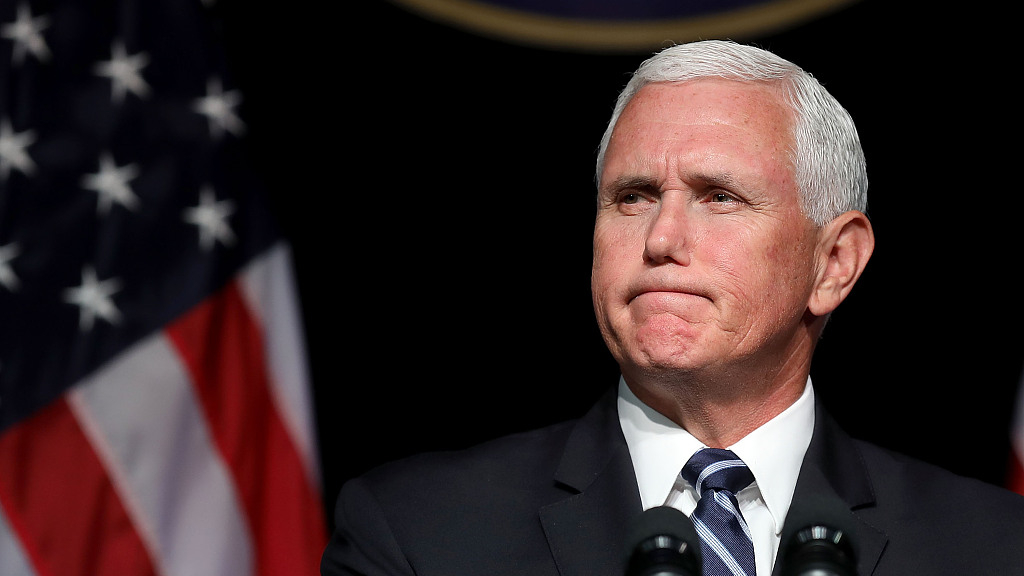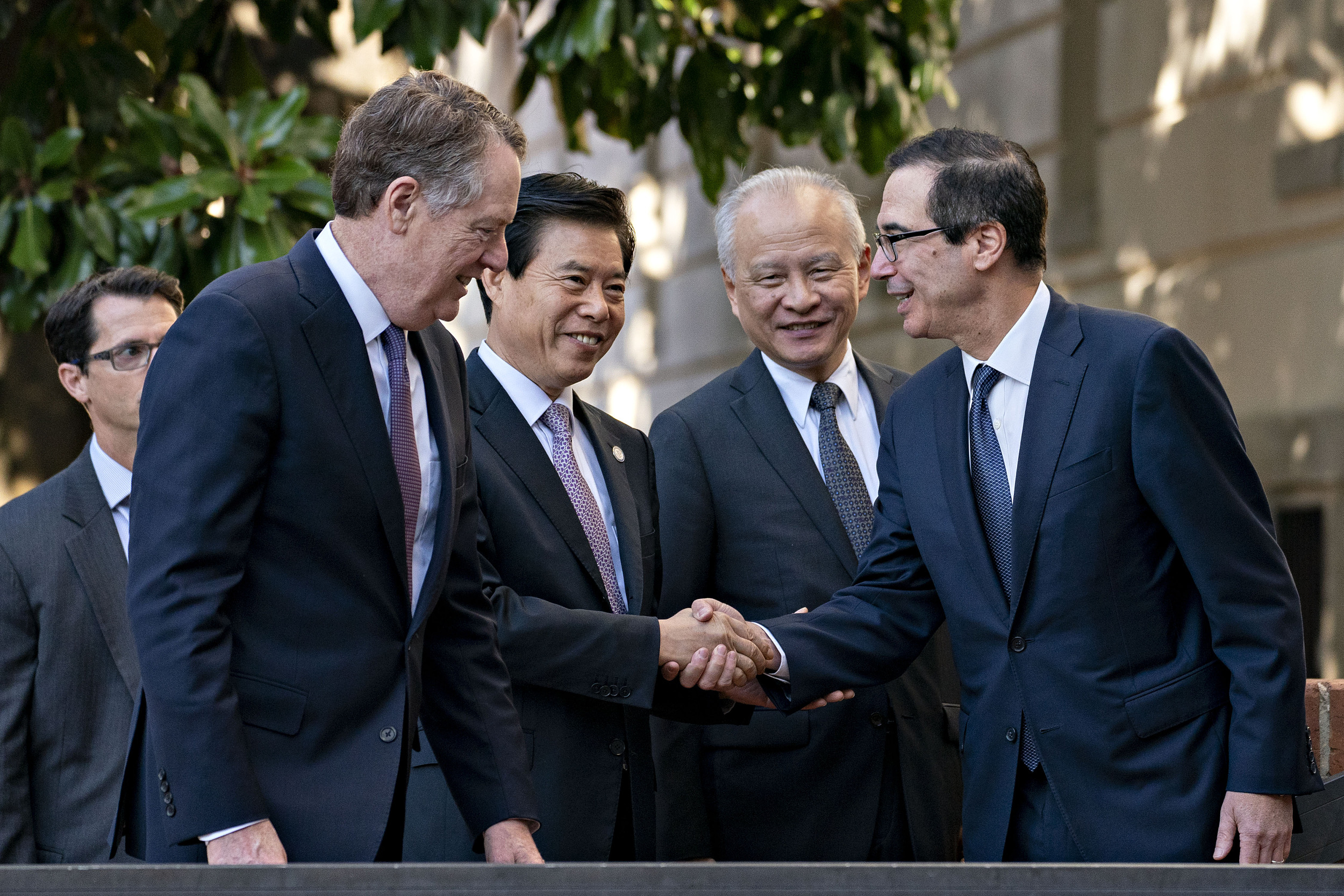
Editor's note: Tom Fowdy is a British political and international relations analyst and a graduate of Durham and Oxford universities. He writes on topics pertaining to China, the DPRK, Britain, and the United States. The article reflects the author's opinions, and not necessarily the views of CGTN.
On Thursday, U. S. Vice President Mike Pence made a speech on China at the Wilson Center. The speech had been hotly anticipated for some time, but repeatedly postponed. It had been touted as significant due to the known hawkishness of the former Indiana Governor, as well as speculated resemblance to an aggressive speech against Beijing which he made the year before, which was seen as a "game-changer" for U.S.-China relations.
However, whilst being typical of Mike Pence's style in many ways, the speech was neither as inflammatory nor escalatory as expected. The Vice President used his time to slam the NBA and Nike, show a moderated support for Hong Kong, play up the "China threat" notion but also crucially, left the door open for dialogue and constructive relations with Beijing on the matter of trade and economics; explicitly ruling out talk of "decoupling the two economies."
In this case, although Mike Pence is always going to be Mike Pence, China won't be losing any sleep over this speech and in many ways, it is a sigh of relief and a clear indicator the administration is no longer seeking to further deteriorate ties with Beijing. In this administration, the Vice President has always been used in a symbolic way to present a "tough" Foreign Policy stance and set a new agenda, only to disappear from the scene when dialogue begins.
Whilst many feared that might be the case here, Pence instead shown restraint from his position, and in turn, this suggests the White House may now be looking for a more stable outlook negotiating with China, but nevertheless retaining areas of disagreement and contention. Although one can never be sure, there is an increasing possibility that the trade war itself is being phased out.
Mike Pence is known as an individual for his very dogmatic, socially conservative and religious outlook which places him to the right of Republicans. To put it mildly, he has his beliefs and subsequently advocates a hawkish view of foreign policy. This has given him a very specific role in the Administration's diplomatic behavior; that he, for the most part, heralds a low profile, largely featuring in a symbolic way in "setting the agenda" when the White House is seeking to take an aggressive stance against a particular issue.

U.S. Treasury secretary Steven Mnuchin (R) shakes hands with Chinese commerce minister Zhong Shan (2nd L), October 11, 2019. /VCG Photo
U.S. Treasury secretary Steven Mnuchin (R) shakes hands with Chinese commerce minister Zhong Shan (2nd L), October 11, 2019. /VCG Photo
For example, when the White House announced their "maximum pressure" policy on the DPRK in 2017, Mike Pence visited Panmunjom in South Korea and made a speech. Similarly, he also turned up at the Winter Olympics in Pyeongchang the following year. However, when Trump opened up a dialogue with Kim Jong-un, Pence completely disappeared from the public scene on the issue and has not emerged since. Likewise, last year Pence's Hudson Institute speech, which was sharply antagonistic to China was also a "game-changer" in ushering in a more aggressive stance in U.S.-China relations.
As a result, his speech last night was presented as significant in measuring the course by which the U.S.-China relationship would head in. However, by Pence's own standards and positions, this speech was moderate and restrained. Whilst it is inevitable he would raise the issues which he raised due to his personal outlook, nevertheless, the speech will not cause anxiety or anger in China because it did not push new boundaries or opt for escalation. On the negative angle, there was nothing new whatsoever.
Instead and what is most important here, is that he effectively left the door open for an end to the trade war and a new opt for stability. The fact that an ultra-hawk such as Pence has openly ruled out the idea of "decoupling" the U.S.-China economic relationship, a term which has been consistently thrown around in the trade war, is very significant; thus he green-lighted the idea that stable China-U.S. trade ties attained by negotiations, is possible and acceptable.
In this case, the fundamental "paradigm" being used by the appearance of Pence seems to suggest a symbolic move by the White House to draw a "bottom line" on how far it is willing to push against Beijing on an economic level, but nevertheless as the speech illustrated, some areas of disagreement and contention will inevitably remain.
In this case, the Vice President is again being used to set a "new normal" in a foreign policy stance, but one which is moderated. Concerning the trade war, this actually paints optimism rather than pessimism. Beijing will interpret this from the administration's most hawkish member as an incentive to negotiate rather than a provocation. The U.S. will of course remain in being more Anti-China than it was pre-Trump and continue to tout the "China threat," nevertheless cutting past the noise, and comparing this with Trump's rhetoric, it appears there is now a firm door open to bringing the trade war to an end.
(If you want to contribute and have specific expertise, please contact us at opinions@cgtn.com.)